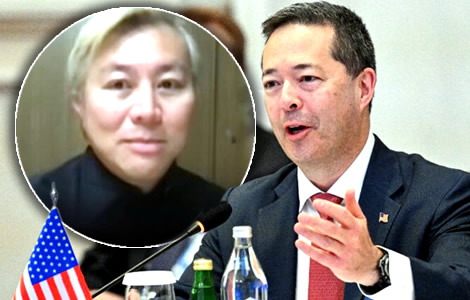Thailand must embrace global mediation in its Cambodia border conflict or risk isolation, warns exiled diplomat Dr. Pavin. Echoing the incoming U.S. envoy to Bangkok, O’Neill, he says deadly clashes that killed 43 and displaced 300,000 could jeopardise key U.S.-Thai alliance.
A former Thai political activist, now exiled in Japan, is calling on Bangkok to bring international bodies into the Thai-Cambodian border dispute. Dr. Pavin Chachavalpongpun, a bête noire of Thailand’s conservative establishment, says the government must stop going it alone. On Wednesday, his warning echoed that of incoming U.S. Ambassador Sean O’Neill, who told a Senate confirmation hearing that the U.S. sees no benefit in the ongoing clashes. The message is clear: Thailand must act fast—or risk isolating itself. The past week’s violence has exposed just how critical the U.S.-Thailand alliance is. With an increasingly volatile regime in Phnom Penh, analysts say Thailand needs this key military alliance more than ever—and that means showing it’s serious about peace.

The former Thai diplomat has urged the government to seek international help in resolving its growing border conflict with Cambodia. Dr. Pavin, once a diplomat with Thailand’s Ministry of Foreign Affairs, is currently in political exile in Japan. He issued his warning in a Facebook post on July 30, calling for urgent diplomatic action.
Dr. Pavin stressed that Thailand should not rely solely on a military response. According to him, a military-only approach could severely damage Thailand’s international standing. Moreover, he believes it would weaken critical strategic alliances, especially with the United States.
Notably, Dr. Pavin is well known for his frank political commentary. He has previously challenged Thailand’s conservative elite and military-linked politicians. His remarks carry some weight, particularly among younger and reform-minded Thais. At the same time, many everyday Thais see his views as beyond the pale.
Thailand’s border conflict with Cambodia highlights urgent need for peace and international cooperation
For instance, on the border issue, there is overwhelming support presently for the Royal Thai Army’s role in this conflict since it erupted — particularly given the sacrifices made by heroic young soldiers.
Nevertheless, in Pavin’s view, the conflict with Cambodia has highlighted the value of Thailand’s alliance with the United States. Therefore, he argued that maintaining this alliance requires Thailand to support a long-term solution. That includes peaceful negotiations and cooperation with international bodies.
He said Thailand must be seen as a responsible player in global affairs. As a result, the government should welcome mediation or third-party involvement. “Thailand must prove it is a serious and mature nation,” he wrote. “Peace cannot be achieved through bullets alone.”
Meanwhile, Sean Kotaro O’Neill, the incoming U.S. Ambassador to Thailand, echoed many of these concerns. During his Senate confirmation hearing on July 29, O’Neill made it clear that border clashes serve no strategic purpose.
He said, “Conflicts like this do nothing to benefit the Thai people. They harm the alliance and drain resources.” O’Neill’s comments came in response to recent clashes that left at least 43 dead and displaced over 300,000 people.
Sean Kotaro O’Neill’s extensive regional experience shapes his firm position on Thailand’s border dispute
Notably, O’Neill is a career diplomat with deep ties to the region. He has served two tours in Thailand, including as U.S. Consul General in Chiang Mai. He also worked in Myanmar, Afghanistan, Bangladesh and Hong Kong.
In Washington, he has held influential posts as legislative advisor to the Chairman of the U.S. House Foreign Affairs Committee. He also advised the Commandant of the U.S. Marine Corps and served as a senior official in the State Department’s East Asia Bureau.
According to the State Department, O’Neill’s knowledge of Thai, Chinese, Burmese, Japanese and Bengali gives him a unique regional edge. His understanding of Southeast Asia is seen as a major asset for future U.S. diplomacy in the region.
Despite his strong credentials, O’Neill’s comments triggered a backlash on Thai social media. Many users accused him of oversimplifying a complex conflict. One commenter said, “You speak as if Thailand should just take fire without defending itself.” Another asked, “Have you even been to the border?”
Dr. Pavin defends U.S. ambassador and warns Thailand against war rhetoric to avoid losing US support
Yet Dr. Pavin defended O’Neill. He argued that the ambassador’s goal is peace, not criticism. Furthermore, he said Thailand risks being left isolated, dealing with an unpredictably dangerous foe. “If we don’t want to lose the U.S., Cambodia has China as an ally, we must stop this war talk,” he wrote.
He urged Thai officials to tone down aggressive rhetoric. According to him, even casual government statements about continued fighting could damage relations with Washington. “Words matter,” he warned. “Especially when alliances are at stake.”
President Donald Trump, who returned to office in January 2025, also took a firm position. Over the weekend, Trump warned both Thailand and Cambodia that U.S. trade talks would be suspended unless violence stopped.
As a result, Thai and Cambodian leaders met in Malaysia on Monday. The talks led to a ceasefire agreement—the bloodiest fighting in over a decade now appears paused. The United States welcomed the agreement and urged both sides to adhere to the deal.
Ceasefire is only the beginning, says Dr. Pavin, calling for credible peace plan with international mediation
Still, Dr. Pavin cautioned that the ceasefire must be just the beginning. “Words without a peace process won’t be enough,” he said. He called for Thailand to propose a credible long-term framework for conflict resolution.
According to Pavin, this framework should include a neutral observer or mediation body. For example, ASEAN or the United Nations could be invited to oversee negotiations. Importantly, Thailand must be seen as accepting international norms and rules.
He said this would send the strongest signal to the United States. If Thailand demonstrates responsibility, Washington is more likely to offer support—in diplomacy, politics or even economic cooperation.
Meanwhile, analysts in Bangkok are questioning Cambodia’s motives. Many now believe Cambodia provoked and engineered the latest round of violence—not to solve or engage Thailand in border dispute resolution. Instead, they suggest Prime Minister Hun Sen may be using the crisis to divert attention.
Analysts claim Cambodia uses border conflict as smokescreen to shield its online scam economy
These analysts point to Cambodia’s vast online scam industry. This shadow economy allegedly makes up half of the country’s GDP. Critics say the regime wants a war narrative to distract from the growing criminal underworld.
“The border dispute acts as a smokescreen,” said one Thai political analyst. “It allows Cambodia’s leadership to rally nationalism and avoid internal and indeed international accountability.”
In this context, Thailand must tread carefully. Dr. Pavin warned that overreacting militarily could play into Cambodia’s hands. “Don’t let yourself be used as the villain in someone else’s play,” he cautioned.
Moreover, the US is watching Thailand’s response closely. The US administration had previously offered muted support for Thailand during past skirmishes. Under Trump’s current administration, however, the cost of ignoring U.S. concerns appears higher.
U.S. envoy O’Neill also addresses Myanmar crisis, urging Thailand not to legitimise military junta elections
During his hearing, O’Neill also addressed Myanmar’s ongoing crisis. He said the US would not recognise the military junta’s planned elections. “No election is legitimate if over half the population cannot vote,” he said. “Especially while opposition leaders remain jailed.”
He encouraged Thailand to take the same position. According to O’Neill, the junta’s planned vote this autumn lacks all democratic credibility. Therefore, any recognition of such an election would be seen as undermining democracy in the region.
Dr. Pavin backed O’Neill’s stance. He said Thailand must not legitimise authoritarian regimes. Supporting sham elections, he argued, would place Thailand on the wrong side of history.
Thailand now finds itself at a crossroads. Its handling of the Cambodia border conflict, as well as its response to Myanmar, will shape its regional reputation.
The stakes are high. Thailand is one of America’s few treaty allies in Asia. The alliance dates back to 1954 and has provided defence, trade and security cooperation for decades.
Dr. Pavin warns reckless actions risk isolating Thailand and urges leadership with diplomacy, not just defence
Yet Dr. Pavin fears that reckless actions or poor communication could jeopardise this historic relationship. “We must not isolate ourselves,” he warned. “It’s time to lead with diplomacy, not just defence.”
He noted that even in domestic political disputes, miscommunication can erode public trust. The same applies to foreign affairs. Therefore, he urged Thai leaders to speak clearly, responsibly and with peace in mind.
Cabinet meets after Cambodian ceasefire. Acting PM Phumtham spoke later with Trump for 30 minutes
Ceasefire in effect across Thai-Cambodian border conflict zone, wary officials to meet later for review
Acting PM travels to Kuala Lumpur for ceasefire talks. Cambodia’s PM Hun Manet to attend amid PR war
While the ceasefire is a positive first step, Dr. Pavin believes the real work lies ahead. Creating lasting peace, he said, requires vision, patience, and international cooperation.
Finally, Dr. Pavin called for calm, clarity, and commitment. He said Thailand must choose peace over pride, alliances over antagonism, and global leadership over regional hostility. If it does, he said, Thailand could not only end a costly conflict—but also emerge stronger on the world stage.
Join the Thai News forum, follow Thai Examiner on Facebook here
Receive all our stories as they come out on Telegram here
Follow Thai Examiner here
Further reading:
Cabinet meets after Cambodian ceasefire. Acting PM Phumtham spoke later with Trump for 30 minutes
Acting PM travels to Kuala Lumpur for ceasefire talks. Cambodia’s PM Hun Manet to attend amid PR war
Hot War rages on the Thai-Cambodian border following Cambodian troops offensive in Chong Bok area


















